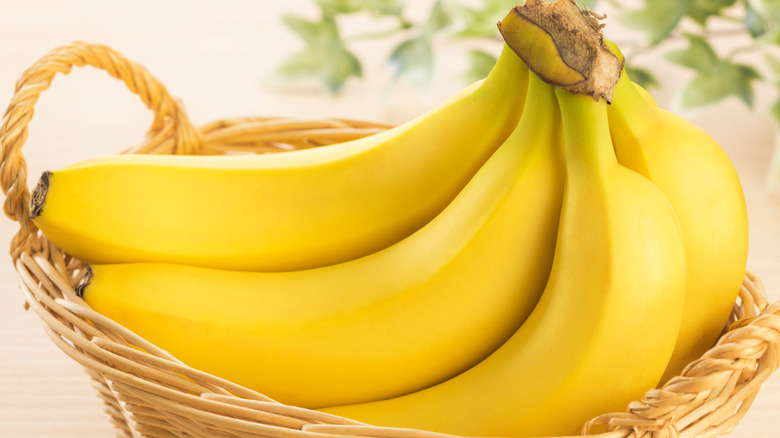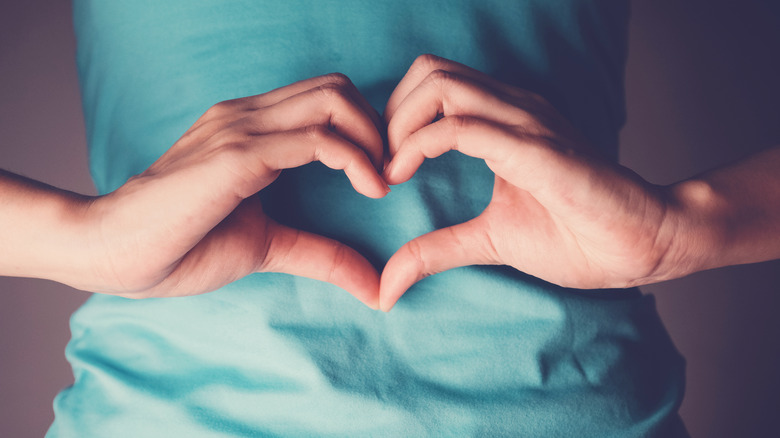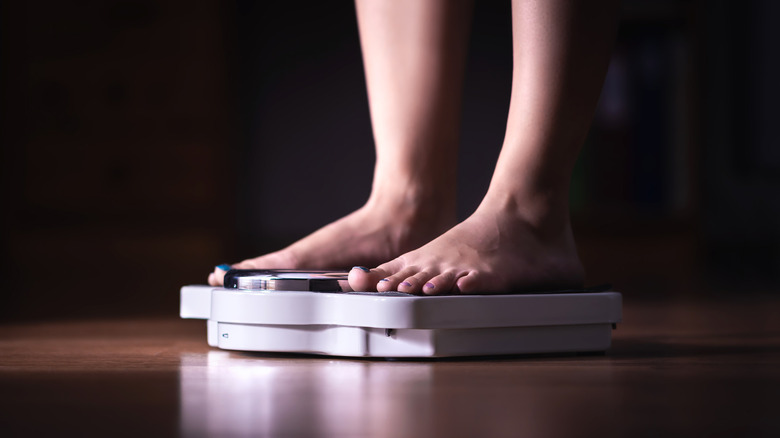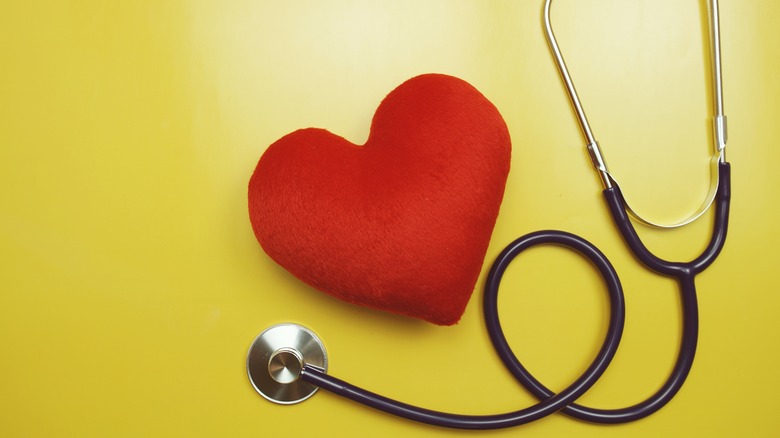Unexpected Side Effects Of Eating Bananas
Bananas are a popular fruit that can satisfy a sweet craving. According to Statista, people in the U.S. consumed about 27 pounds of bananas in 2020, and that's been the average for the past 20 years. It shouldn't be too surprising, given that bananas are one of the original fast foods. They might also be one of the most nutritious and beneficial fruits. In fact, the American Medical Association hailed them as the first superfood in the early 20th century (via Harvard T.H. Chan School of Public Health).
You might be more familiar with the yellow bananas found at the supermarket, but there are also green bananas (known as plantains), red bananas, and Lady Fingers, which are shorter and sweeter than yellow bananas. Whichever of these fruits you prefer, they are all nutritious. They contain potassium, vitamins B6 and C, manganese, magnesium, and fiber — all compounds that help your body in one way or another, per the Harvard T.H. Chan School of Public Health. If you regularly consume bananas, you may experience some of these unexpected side effects.
Your digestion may improve
Gut health is a popular topic these days, and for good reason. If your gut biome is out of whack, it could lead to problems including irritable bowel disease, leaky gut syndrome, and even obesity, according to a 2019 study published in the journal Nutrients. Bananas can help improve your gut health in a couple of ways. First, one banana contains about 3 grams of fiber, and fiber adds bulk to your intestines, which helps things move along (via Healthline).
Green bananas offer something else that might help with digestion. Healthline explains that green bananas contain more resistant starch, which acts like a prebiotic. This is beneficial for your intestines because resistant starch feeds the good bacteria living there. The bacteria then trigger the production of short-chain fatty acids, which might help some digestive issues. That said, some people may experience gas, bloating, and constipation after eating green bananas. If you are allergic to latex, you should be cautious with green bananas because they have proteins similar to the proteins in latex that cause reactions.
You might lose weight
The fiber in bananas is good for more than just your gut. It might lead to less snacking throughout the day. Eat This, Not That! explains that the reason why is because it takes time for your body to digest fiber, which makes you feel fuller longer. When you feel full, you're less likely to reach for a snack or overeat.
On their own, bananas have about 100 calories, which makes them a perfect low-calorie, sweet snack. Not only that, but they add other nutrients to your diet. If you want a snack that will make you feel fuller even longer — along with adding even more nutrients — you should try pairing one with a cheese stick, some nuts, or peanut butter. With the added protein, you end up with a satisfying snack that not only helps you feel full but also satisfies a sweet craving (via Eat This, Not That!).
Your high blood pressure could improve
Thanks to their potassium content, bananas can help you manage your blood pressure. High sodium levels are one of the causes of high blood pressure (hypertension), and potassium helps your body rid itself of sodium through urine. In addition, with hypertension, your blood pushes against the walls of your blood vessels, creating pressure. Potassium can help relieve this pressure, and that could also help lower blood pressure, according to the American Heart Association.
That's not the only way that bananas can help with nigh blood pressure. People taking blood pressure medications may also benefit from adding bananas to their diet. The reason is that some blood pressure medications cause frequent urination, and that might cause low levels of potassium and an increased risk of type 2 diabetes, per Johns Hopkins Medicine. In addition, a lack of potassium can impact the heart muscles and the heart rate, according to Everyday Health.
Your heart might benefit
Aside from helping improve your blood pressure, evidence suggests that the potassium in bananas might even help the overall health of your heart. In 2017, researchers at the University of Alabama studied mice and found that those on a low-potassium diet had thicker arteries than those who were supplied with high levels of potassium. Reader's Digest reports that low levels of potassium might lead to heart arrhythmias, and may slow blood flow to the brain. On the other hand, potassium helps regulate your heartbeat, and this might aid in preventing heart disease.
Potassium may also stave off strokes. A 2011 study published in the Journal of the American College of Cardiology showed that high levels of potassium were linked with lower rates of stroke. Researchers found that by increasing potassium by 1,640 grams per day, the risk for stroke was reduced by 21%. Not only that, but potassium might lower the risk of cardiovascular diseases and congenital heart disease.
You could lower inflammation
Inflammation is a hot topic because too much of it in your body can lead to a host of problems. Chronic inflammation might cause asthma, arthritis, heart disease, cancer type 2 diabetes, and Alzheimer's Disease, as reported by the Cleveland Clinic.
One way to combat inflammation is to eat a diet that is rich in fresh fruits and vegetables, and that's where bananas come into the picture. Bananas are rich in bioactive compounds, some of which protect the body against free radical damage. These elements also have antioxidant properties that may reduce the risk of neurodegenerative diseases and could also be anti-aging as well, per Livestrong. In addition, the carotenoids in bananas aid your body in fighting some chronic health conditions. Furthermore, they might even help slow down how quickly your body ages. Because of their magnesium content, bananas might be a healthy way to help ease arthritis symptoms caused by inflammation.






